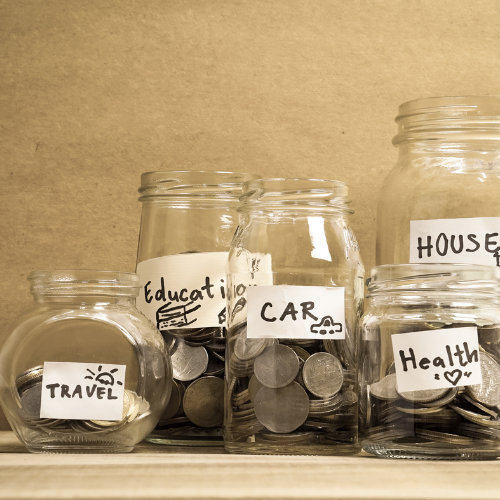You’ve made your decision you want to start saving money, for whatever reason this may be such as early retirement, clearing debts or just to free up some spare cash each month. Regardless of why you have made the choice, here are 5 simple steps to start saving you some money.
List everything you spend –
This has to be the first step for anyone on this journey, how can you save money without knowing what you have spent?
Seeing exactly how much you have been spending in black and white can sometimes give you a bit of a wake-up call, but it can also be a bit of a shock to some people. Don’t be scared of this step, yes it might be a bit scary but we all need to start somewhere with this.
This is often called tracking your spending and there is various ways to do this. Some people like to do it in the traditional way of a notebook and pen or others like excel. Whichever way you do this, the key is to make sure you have everything listed down. It is also handy to list whether it is cash, cheque or card so you can understand your finances.
If you want to get started straight away, why not look through your last few months worth of spending on your bank account. Most banks allow you to download your statements via excel, this means you are then able to filter and total the spends per category really easily.
Doing this is not to panic you or make you feel guilty, it is all about understanding exactly where your money has been going every month and make decisions based on this.
Automate transactions where possible
Sometimes life gets in the way of things and no matter how good our intentions are, they don’t always go to plan.
Looking at automating your transactions is a way to help ensure our payments are all made on time and ensuring you don’t miss a payment date and incur a late payment charge.
We may set out with the very best of intentions with things, particularly our finances, but life gets in the way. We get ill, our loved ones get ill, we do a ton of work and overtime and are exhausted.
We are only human after all and can’t remember everything. As important as paying your debt is off to you, when you have an emergency crop up, it will probably be the last thing on your mind.
Everything that you can automate, do it. Set up direct debits for your bills and you will never miss a payment. Set up standing orders for money to be taken out of your account and put into savings. Both of these are important, because if you miss a payment on a bill, it will affect your credit score, and you will probably have unplanned for interest to pay on it. You literally pay for the fact that you forgot to pay it!
When it comes to savings, what we tend to do – yes, I have been guilty of it myself and am of course generalising here as not every single person does this – is pay our bills, and then spend what is left after.
Whilst I’m a huge advocate of having fun (I’m not about that extreme frugal life), if you have goals that you are trying to achieve, they’re going to be pretty impossible to reach if you aren’t saving any of that cash that you have worked so hard to make.
The best thing about doing this is that you forget that you had the money there and end up not missing it…so the savings add up and up, getting you ever closer to your goal.
Zero-Sum Budget
This is a new sort of budgeting for me, however, if you are trying to get your budget on track, this budget is the way to do it.
Zero-sum budgeting is the method where all of your money is allocated each month – so instead of paying your bills and then spending whatever is left after, you allocate all of your money so that you don’t just have ‘free’ money that is floating around, because let’s face it…we will probably want to spend it!

This doesn’t mean you are not allowed to spend any money on fun things or days out, you can, it just means you allocate a set amount each month to do so.
An example is if you have £300 leftover after bills each month and usually end up spending it on random stuff, you can instead allocate it to categories – the reason that it’s called a zero-sum budget is that all of your money gets allocated to categories.
Examples could be:
- Savings
- Sinking fund
- Emergency fund
- Christmas
- Birthdays
- Entertainment
- Date night
As you can see, it’s completely up to you to decide what you want to spend your money on – it’s all about making you more aware of how much you are spending, having a plan for your money, and making sure that some are saved.
Shop around and switch supermarkets
If you are living on a tighter budget, shop around for where you plan to do your food shop.
Just switching from one large, slightly more expensive supermarket to a well known cheaper alternative could save you £30-£40 a week on the food bill and this soon starts to add up! The cost of groceries can vary wildly each month and between different households too, don’t feel guilty if you can’t feed your household for £20 a week where others can, just make sure you are making informed choices for your family.
Food is something that we love, so we tend to buy a lot of it, and can buy based on emotional thoughts – but if you plan out your meals and do things like having a day with no meat, you can save a lot of money.
There are other ways that you can save as well, such as bulk cooking which is where you cook a lot of meals and/or snacks at once so that you are prepared for the week ahead (you can freeze the meals and defrost when needed).
However, one of the best ways to save money on grocery shopping is to change your supermarket. If you are shopping at one of the big supermarkets such as Tesco, Asda, Sainsbury’s, Waitrose etc – it is not surprising that your food bill may be quite high, as they are quite expensive shops.
Places like Aldi and Lidl are great because the prices are really low, but the quality doesn’t suffer because of this – the meat, in particular, is very good, as is the fruit, veg etc.

Find Free Entertainment
Entertainment is another chunk of the budget that can escalate quickly and varies drastically from person to person – it could be in the form of eating out, going to the cinema, out for drinks, going shopping. Then there are things with the kids such as trips to the cinema, soft play, going to the shops and buying them toys, magazines…etc. It seems never-ending!
But it’s ok, because there are in fact loads of free things that you can do for fun, and they won’t be boring either. It’s usually all about the company you keep anyway!
Some free entertainment ideas, for either you and your partner/friends or with the kids, could be:
Trip to the beach
Day at the park (this is all kids need for entertainment really!) Geocaching Picnic Museum (lots have free entry) Use vouchers such as Tesco Clubcard ones for a meal out Do mystery shopping at a restaurant for a free meal (and a fee!) Home cinema Bike ride Library trip These are just a few ideas but there are a ton more things that you could do, and as you can see from the examples above – you can go out or stay in and still have a good time without spending a lot of money.
What is your favourite way to start saving money? If you are looking for ways to save money before the end of the month, why not check out these great ways to do so.






One thought on “5 simple steps to start saving money”
Comments are closed.